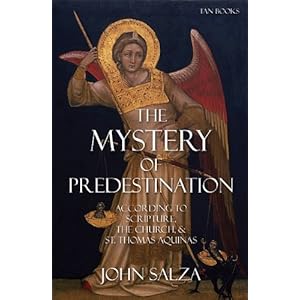
Well, it's not quite that, but John Salza's The Mystery of Predestination: According to Scripture, the Church, and St Thomas Aquinas
How can an all-loving God choose some people for eternal salvation while permitting others to fall away? Doesn't God offer the same amount of saving grace to everyone? Isn't predestination a Protestant doctrine? In The Mystery of Predestination , author and apologist John Salza, seeks to answer these questions, and others, about that most ineffable and confounding of Christian beliefs: that God chooses to infallibly direct certain people to salvation but not others. Drawing deeply upon Scripture, Sacred Tradition, and the writings of St. Thomas Aquinas, Salza says that a proper Catholic understanding of the doctrine of predestination is interconnected with two other central mysteries: the ability of mankind to choose freely to accept or reject God's saving grace, and the inability of mankind to accept God's grace without first being moved by His grace from within. By holding these truths always before us we can see how God may predestine His elect to heaven but never desire that anyone go to hell. We can also achieve a new clarity and depth of insight into a profound Christian truth: God is the primary mover in salvation. It is He who chooses, seeks, and saves us. Meticulously researched and written in a scholarly yet accessible style, The Mystery of Predestination is perfect for the serious Catholic who is confused by Bible verses or Magisterial statements in favor of predestination (and never hears about it in Sunday sermons), or who wants to defend Catholic truth against Calvinist error, and is seeking clear, traditional, and Thomistic answers. Or, indeed, for any thoughtful Christian who wants to come to terms with what the Bible teaches about the fundamental truths of our salvation.The author is clearly well acquainted with not only the Biblical literature and Catholic theological tradition, but also with the Lutheran and Calvinist Protestant traditions that take issue, at points, with the Catholic position. This little book is a good place to start for anyone interested in the age-old problem and the debates surrounding it.